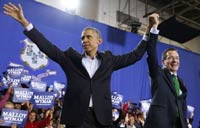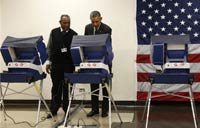 |
| Obama makes final campaign push, hoping to avert electoral rout |
 |
| Obama votes early in Chicago, encourages others to follow |
Monday's Real Clear Politics average had the Republican Party (GOP) ahead by two points, the New York Times' LEO model tagged the likelihood of Republicans retaking the Senate at 70 percent, and the Washington Post's Election Lab model gave the GOP a whopping 97 percent chance. Many experts also gave the lead to the GOP.
"Republicans likely will do well in this year's midterm elections," Brookings Institution's senior fellow Darrell West told Xinhua. "It looks like Republicans will pick up seats in the House and Senate. They have a strong chance of getting majority control of the Senate."
Republicans have a historical advantage known in political science parlance as the "six year itch" -- a tendency for the electorate to turn against the party in power during the second half of a president's second term.
"The GOP has a natural advantage in this election because second term midterms are marked by a fatigue for the president in power, in this case (President Barack) Obama," Dan Mahaffee, an analyst with the Center for the Study of the Presidency and Congress, told Xinhua.
The phenomenon goes back several decades. The House lost 72 seats in 1938 during President Franklin Roosevelt's administration. Four seats were lost in 1966 -- in the second term midterms during the Kennedy-Johnson administration, as well as in 1974 with the Nixon-Ford administration. Six seats were lost in the 2006 second midterms when George W. Bush sat in the White House.
In Tuesday's midterms, the magic number is six seats for the Republican Party to take back the Democratic-controlled Senate. The GOP currently controls the House of Representatives, and a big win on Tuesday would give Republicans control of the Senate. The GOP needs six seats to retake the Senate.
Midterms also naturally favor Republicans, as their base tends to get out to vote while Democrats' base -- youth, women and minorities -- tend to have a stronger turnout in presidential elections.
"The electorate in midterms tends to be older, whiter, and more male," Mahafee said.
Moreover, many pundits, experts and observers say the midterms are a referendum on the leadership of the president, as critics have blasted him for what they bill as demonstrating a lack of leadership on a number of issues including the economy and foreign policy.
